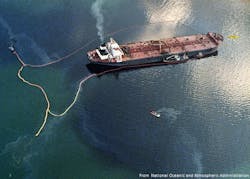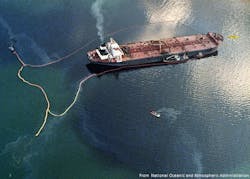Wildlife recovery in Prince William Sound has been extensive enough to warrant closing federal and state legal actions against ExxonMobil Corp. from the March 1989 grounding of the tanker Exxon Valdez and subsequent crude oil spill into the sound, the US Department of Justice and Alaska Department of Law jointly announced.
A 1991 civil settlement required ExxonMobil to pay the state and federal governments $900 million over 10 years to reimburse past costs and fund restoration of injured natural resources. The two governments said the Exxon Valdez Oil Spill Trustee Council, which it formed soon after, used money from the settlement for significant restoration in areas where the spill had an impact.
An unresolved aspect of that settlement was a provision in the consent decree allowing the governments to seek up to another $100 million from the multinational oil company if unanticipated losses in populations, species, or habitats were found later. This “Reopener for Unknown Injury” included presenting a detailed plan to ExxonMobil by Sept. 1, 2006, for how to restore the substantial loss or decline of natural resources.
The governments took preliminary action that year to preserve a potential reopener claim by presenting to ExxonMobil a plan to address patches of oil from the Exxon Valdez spill that recent surveys had found in the subsurface sediments and among rocks of a number of beaches in the spill area.
They said when the company chose not to participate, the two governments undertook the habitat restoration plan’s first stages, which were a series of scientific studies to improve understanding of why the oil had not yet degraded and to design specific measures to make it nontoxic. “These studies will inform restoration and resource management decisions both in Prince William Sound and in similar areas across the US and the world,” they said in their Oct. 15 announcement.
During this period, however, continued wildlife monitoring showed that the harlequin ducks and sea otters which had looked vulnerable to the lingering oil in 2006, have recovered to pre-spill population levels and are no longer exposed to oil more than populations outside the spill area, the two governments said. Based on that information, they and their departments and agencies on the trustee council decided that legal requirements for pursuing a reopener claim are no met, they said.
ExxonMobil did not respond immediately to OGJ’s request for a comment.
Contact Nick Snow at [email protected].
About the Author

Nick Snow
NICK SNOW covered oil and gas in Washington for more than 30 years. He worked in several capacities for The Oil Daily and was founding editor of Petroleum Finance Week before joining OGJ as its Washington correspondent in September 2005 and becoming its full-time Washington editor in October 2007. He retired from OGJ in January 2020.

